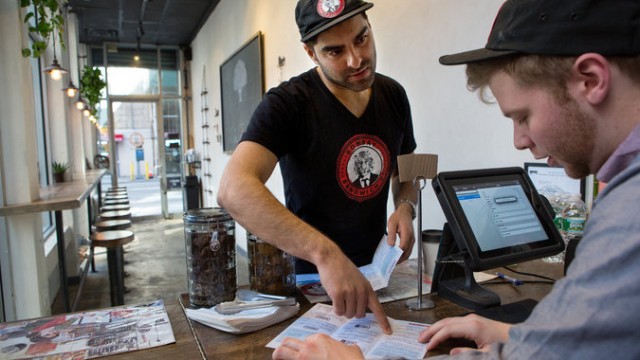REPOSTED from the New York Times.
APRIL 6, 2014
Shiv Puri gathered his employees together after the lunchtime rush last week to deliver the big news: This year, the cook and kitchen staff at the Bombay Sandwich Company on West 27th Street will receive paid sick leave for the very first time.
“It’s a full week,” Mr. Puri explained as he handed out a fact sheet describing New York City’s first paid sick leave law. “That includes whether you’re caring for yourself or a member of your family.”
His eight employees were thrilled. No surprise there. But Mr. Puri, a new business owner, was feeling pretty good, too, after weeks of worrying and calculating the cost of the new law.
“It’s the law and it’s the right thing to do,” he said. “It won’t bust the bank. It won’t put us in jeopardy.”
The law went into effect on April 1. And despite the naysayers and the critics, the skies didn’t fall. Instead, without hoopla or hullabaloo, the city quietly became the largest in the nation to ensure that a vast majority of workers wouldn’t lose their jobs or a portion of their paychecks if they or their close relatives got sick.
For Mayor Bill de Blasio, who significantly expanded the law’s reach when he took office in January, it is a notable and welcome victory. He has been battered and bruised as his efforts to raise the city’s minimum wage and to tax the wealthy to pay for universal prekindergarten foundered in Albany.
But with the paid sick leave law, the mayor has clearly succeeded in making good on his promise “to lift up working families and raise the wage and benefit floor for all New Yorkers.”
As a result of the new law, about 1.2 million workers will have paid sick leave for the first time, according to Nancy Rankin, vice president for policy research at the Community Service Society of New York, a group that works on behalf of low-income New Yorkers. That’s about 240,000 more people than would have received the benefit if the mayor hadn’t expanded the scope of the policy.
Under the new law, companies with five or more employees will have to provide up to five paid days off to workers if they, or their close relatives, fall ill. (Employees accrue leave based on their hours worked.) A weaker version of the law, which passed last year, would have affected businesses with 15 or more workers and did not include the manufacturing sector.
In corporate conference rooms, such changes might be greeted with a yawn. After all, we professionals typically take paid sick leave for granted. But in today’s economy, where the fastest growing sectors are creating low-wage jobs, this change could not be more critical.
Blair Phoenix, 25, who earns $1,300 a month as a cook at Mr. Puri’s restaurant, found that out the hard way. When she was out sick for a week in March, she ended up with a $325 hole in her budget that she is still struggling to fill.
It’s a relief,” Ms. Phoenix, a single mother, said of the new law. “It gives you room to breathe.”
The city’s Department of Consumer Affairs is spreading the word, hosting briefings for business owners and posting ads on subways, buses and bus shelters, and employers seem to be coming to terms with the new reality. Last week, there was so much interest in a briefing with city officials hosted by the New York City Hospitality Alliance that the group had to scramble to find a larger venue. (They expected 100 business owners; 200 showed up.)
As for Mr. Puri, 34, he felt anguished at first over the new law. In his sunlit restaurant, he and his employees often work shoulder-to-shoulder as they chatter about their weekends and favorite musicians while serving up vegetarian sandwiches and wraps.
He prides himself on being a progressive employer and pays his workers $10 an hour, $2 over the minimum wage. Even so, he acknowledges that his first reaction was: “Is this going to put me out of business?”
His concern faded when he learned that sick days only begin once a worker has been on the job for three months (current employees can start taking time three months after April 1). Then he crunched the numbers and realized that he could absorb the cost.
Mr. Puri still worries that some employees might try to take advantage of the new law. (“I guess I’ll have to cross that bridge when I get to it,” he said.) But as a former Wall Street analyst, he remembers how he counted on paid sick leave when he was an employee. His staff, he said, deserves the same.


